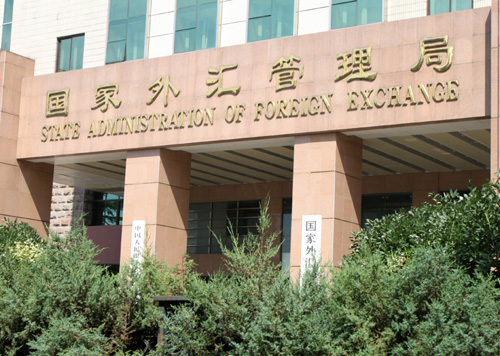
China is strengthening its efforts to diversify the world's largest foreign exchange reserves and increase returns on its portfolio by investing in a private-equity fund.
The State Administration of Foreign Exchange has decided to invest $500 million in a real-estate private-equity fund managed by Blackstone Group LP, the Wall Street Journal reported on Friday, citing anonymous sources.
The fund that SAFE has agreed to invest in is the biggest of its kind, as it has attracted more than $12 billion. Blackstone expects the fund to reach $13.3 billion at the final close in the next few months.
Both SAFE and Blackstone declined to comment on the issue.
|
 |
|
The headquarters of the State Administration of Foreign Exchange in Beijing. [Photo/China Daily] |
The newspaper said SAFE will allocate about 5 percent of the $3.2 trillion foreign reserves to alternative asset classes such as private equity, while investment in government bonds, cash and other liquid assets remains the main trend.
The diversification of China's foreign exchange portfolio is vital for the country to maintain the value of its assets, said Zhang Anyuan, a senior analyst at the economic research institute under the National Development and Reform Commission.
"It's always welcome that SAFE could set different layers to its investment of foreign reserves, and setting aside such a small proportion for high-return but high-risk investment is necessary," said Chen Daofu, policy research chief of the Financial Research Institute at the State Council's Development Research Center.
But given the fact that international financial markets are facing rising pressure due to the current economic situation, liquidity and security should be granted increasing emphasis when authorities are making investment decisions, Chen added.
In 2008, the foreign reserve watchdog poured $2.5 billion into a fund managed by the US-based private-equity firm TPG and suffered losses after the fund's subsequent investment in Washington Mutual, the largest US savings-and-loan firm at the time, was wiped out after the lender's closure by the US government, the Wall Street Journal reported.
SAFE has constantly reiterated that security is its top priority when making investments using foreign reserves, and it has already taken appropriate measures to offset potential major risks.
It has invested most of the reserves in low-yield assets such as government treasury bonds.
China is the largest foreign holder of US Treasuries, having invested about a third of its foreign reserves in those bonds. About 20 percent has been invested in euro-denominated assets.
The capital raising for Blackstone's Real Estate Partners VII fund will end in February.
Its Real Estate Partners VI invested the majority of its capital in business property in the United States, such as shopping mall-owner General Growth Properties Inc and hotel-owner Extended Stay.
But some recent figures have raised doubts over future returns. According to the results of a primary mortgage market survey released by Freddie Mac on Friday, fixed mortgage rates continue to reach record lows.
The 30-year fixed rate mortgage averaged 3.49 percent, while the 15-year fixed-rate mortgage, a popular choice for those looking to refinance, hit a record low of 2.8 percent.
Frank Nothaft, vice-president and chief economist of Freddie Mac, said market concerns over the strength of the economic recovery brought long-term Treasury yields to new lows.
"Existing home sales fell to 4.36 million homes (annualized) in June and represented the slowest pace since October 2011. Similarly, new home sales fell in June to their lowest level since January of this year," he said.
"Investing in real estate can be interesting for investors who wish to invest in real assets and are shying away from volatile financial markets" said Andre Loesekrug-Pietri, chairman of the Beijing-based European PE company A CAPITAL, adding that local and professional teams are very important as this always require local expertise.
Loesekrug-Pietri said the US property market has gone through a long readjustment since the subprime crisis, but as the US economy improves, the conditions may become more attractive in the coming years, both in residential and commercial real estate.
According to him, markets such as China, whose macro drivers for growth include urbanization and consumption, should continue to be attractive for real estate investment, in particular for sophisticated investors that can avoid overheated sectors and identify strong value for money in all market categories.
Contact the writers at wangxiaotian@chinadaily.com.cn and caixiao@chinadaily.com.cn


 Washington to remain focused on Asia-Pacific
Washington to remain focused on Asia-Pacific RQFII target blue chips amid bear market
RQFII target blue chips amid bear market Australian recall for top two exporters
Australian recall for top two exporters China fears new car restrictions
China fears new car restrictions